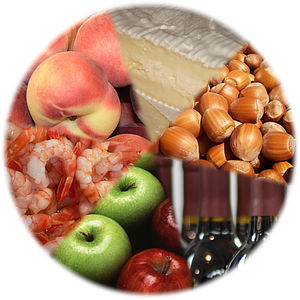
Food types likely to cause allergic reactions in adults in Sweden: drupe, cheese, nuts, wine, apples, and shellfish. Svenska: Födoämnen som ofta utlöser överkänslighetssymtom hos vuxna i Sverige: stenfrukter, ost, nötter, vin, äpplen och skaldjur. (Photo credit: Wikipedia)
More so than at any other time in our collective memory, food allergies are a topic of conversation from the national news channels to the elementary school cafeteria. Peanut butter, that staple of brown bag lunches for the last two generations of American children is all but banned from schools now because of the danger to other students with peanut allergies.
This isn’t just because we are suddenly taking food allergies, like those to peanuts, more seriously. It’s because there are so many more people that are developing food allergies. If we look at peanut allergies as an example, research shows that the incidence of peanut allergies in children tripled between 1997 and 2008. According to the Centers for Disease Control (CDC), the incidence of food allergies during that same time frame increased by 18%.
The week spanning from May 8-14 is Food Allergy Awareness Week and the organizers hope to help raise awareness about these potentially fatal conditions. By increasing awareness, we can increase the number of people who know how to identify the signs of an allergic reaction and how to respond if it happens. This knowledge can literally save someone’s life and is just as important as knowing CPR or the Heimlich maneuver. Awareness also helps those without food allergies remember how important it can be to let others know if food you are serving contains common allergens.
There are 8 foods that account for 90% of all food allergies. Allergies to milk, eggs, soy, and wheat often resolve during childhood although the rate of disappearance seems to be decreasing. Allergies to fish, shellfish, tree nuts, and peanuts are generally lifelong allergies. A food allergy is basically a faulty response by the body’s immune system which results in an attack on a protein in the food. Allergic reactions to food can range from itchy and hives to trouble breathing and anaphylactic shock.
The only way to avoid an allergic reaction to a certain type of food is to completely avoid that food. This is why it is so important to post the ingredients of anything you take to a pot luck or buffet dinner or that you plan to sell at a bake sale. If you work in a school or day care setting where you interact with children that have food allergies, get trained on the use of an Epinephrine or Epi Pen so you can respond quickly in the event of an emergency. Always remember that allergic reactions can be fatal and regardless of treatment given or the proximity to the hospital, you should always call 911 and have emergency responders come to the person having the allergic reaction.
One way you can show your support for Food Allergy Awareness Week during that week and after that week is to decide you will only provide food for sharing that is free of the 8 most common foods that cause allergies. To help you, here are a few recipes that do not include any of these foods.
- Cucumber Delight
- Balsamic London Broil
- Black Bean and Goat Burger Chili
- Citrus Marinated Grilled Turkey
- Lemon Rosemary Lambchops
- Molasses Marinated Beef Tenderloin
- Garlic Sautéed Swiss Chard
- Oven Fried Sweet Potatoes
- Arizona Melon Dessert
- Medjool No Bake Date Roll (just keep the whip cream on the side)
Related articles
- Do allergies actually benefit your health? (fox13now.com)
- How to Get Your Kids to Eat More Vegetables (fillyourplate.org)
- 54+ Apps for the Foodie on the Go (fillyourplate.org)

